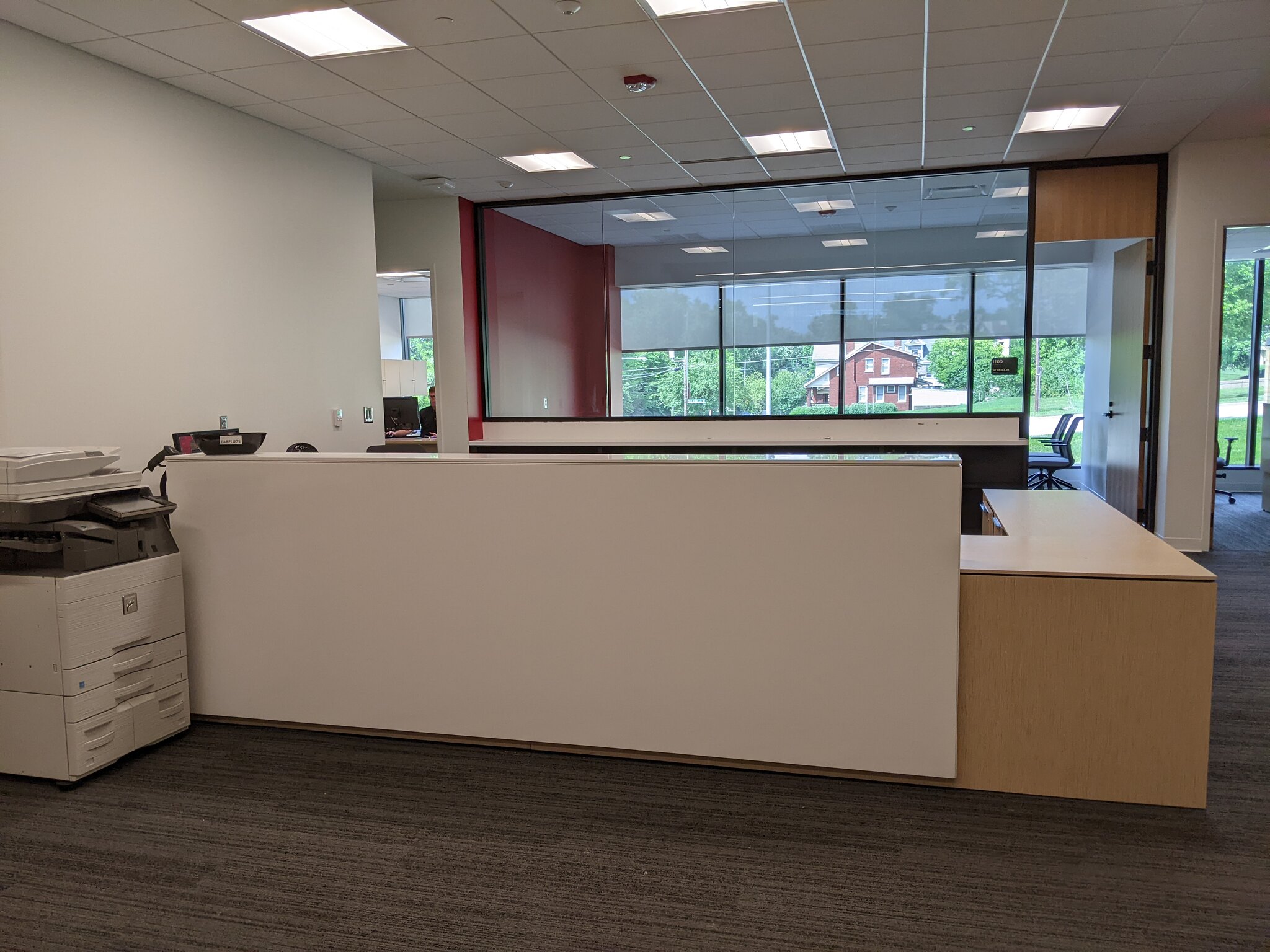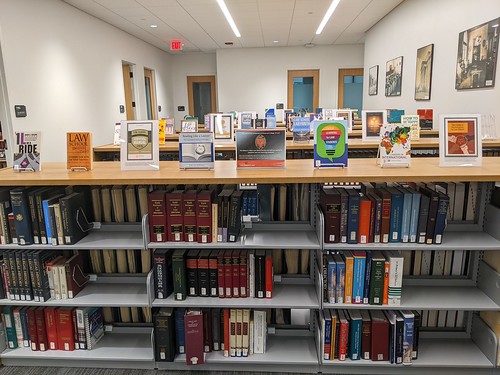This week in the Law Library we welcome everyone back, introduce 1Ls to legal research and sources of legal authority, teach technology in law practice, train Law Review cite checkers, and highlight useful law school survival resources.
Happy 1st Day of Classes!
Welcome back everyone!
Law Library Hours & Services

Library Access
Building doors are unlocked Monday – Friday 8am – 5pm. Law students, law faculty, and law staff have key card access 24/7. Please contact Justin Ellis, Law Library Circulation Manager, if you have trouble accessing the building with your UC Bearcat Card.
Circulation hours
Monday — Friday 8:00am – 6:00pm
Closed Saturday and Sunday
Closed Monday, Sept. 4th
Research & Library Help
Take advantage of librarian expertise! Schedule an appointment, email us, or stop by our offices. We’ll be happy to help with suggestions for sources and tips. Also, don’t forget the Library’s Web page and many research guides.
Library Study Areas
Library seating is found throughout the law school building. Most seating is available on a first-come, first-served basis. Check out our Virtual Tour of the Law Library!
Basement
A limited number of carrels and tables are available in the basement where the law stacks are.
1st Floor
Four group study rooms are available on this floor: 101, 103, 163, 165. They are for law students only and can be reserved through TWEN. Reservations can be made in 2-hour increments for up to 4-hours per student, per day. Keys are available for check-out at the Circulation Desk.
2nd Floor
Library seating on the second floor includes the Law Library Reading Room (Room 270) and group study rooms 227, 271, 273, 275, 276, and 277. Study rooms are for law students only and can be reserved through TWEN. Reservations can be made in 2-hour increments for up to 4-hours per student, per day. Keys are available for check-out at the Circulation Desk.
4th Floor
The fourth floor library seating includes carrels in the Quiet Reading Room (Room 445).
5th Floor
The fifth floor library seating consists of open study space in room 545.
Lockers
Please email Justin Ellis, Law Library Circulation Manager, for a locker assignment.
This Week’s Research Sessions
Tuesday, August 22, 2023
Technology in Law Practice
Shannon Kemen, Legal Technology & Research Instructional Services Librarian
Room 107
11:10am – 12:05pm
Thursday, August 24, 2023
Lawyering I, sec. 2
Susan Boland, Associate Director & Ashley Russell, Instructional & Reference Services Librarian
Room 135
9:00am – 10:25pm
Introduction to Legal Research & Sources of Legal Authority
Lawyering I, sec. 4
Ronald Jones, Electronic Resources Instructional Services Librarian
Room 170A
10:40am – 12:05pm
Introduction to Legal Research & Sources of Legal Authority
Technology in Law Practice
Shannon Kemen, Legal Technology & Research Instructional Services Librarian
Room 107
11:10am – 12:05pm
Lawyering I, sec. 6
Susan Boland, Associate Director & Ashley Russell, Instructional & Reference Services Librarian
Room 170A
1:30pm – 2:55pm
Introduction to Legal Research & Sources of Legal Authority
Law Review CiteChecker Training
Susan Boland, Associate Director
Room 230
5:00pm – 6:00pm
Friday, August 25, 2023
Lawyering I, sec. 5
Susan Boland, Associate Director & Ashley Russell, Instructional & Reference Services Librarian
Room 230
10:40am – 12:05pm
Introduction to Legal Research
Study Aids
Study aids can be an important tool to help you succeed in law school. Remember that not all study aids are created equal and that the different types of study aids serve different purposes.The majority of our study aids are available online through West Academic, Lexis Overdrive, Aspen Learning Library, and CALI. We have selected print copies of study aids in the Law Library Reading Room. For more information on accessing our study aids, view our Introduction to Study Aids video.
West Academic
To create an account, click the Create an Account link at the top right corner of the Study Aids Subscription page. Use your UC email as the email address. Once you have filled in the required information to set up an account, you will need to verify your email address (they will send you a confirmation email that you will need answer to verify the email address — be sure and check your junk mail). Once you have created an account and logged in, you can use the links below to access individual study aids or you can access all study aids through https://subscription.westacademic.com. To access study aids even when offline, use the app. Accessing West Academic Study Aids Offline.
LexisNexis Digital Library (OverDrive)
If accessing study aids from LexisNexis Digital Library (OverDrive), you will need to login using your UC credentials.
Aspen Learning Library
If accessing study aids from the Aspen Learning Library subscription (formerly WK), you will need to login using your UC credentials.
CALI
If using CALI, you will need to create an account (if you have not already done so) using a Cincinnati Law authorization code. You can obtain this code from a reference librarian.
To view study aids by subject, go to the Exam Study Guide.
Featured Study Aid
CALI
CALI stands for Computer-Assisted Legal Instruction. CALI.org is a non-profit consortium of law schools – of which UC Law is a member – that develops and distributes legal education lessons to the consortium members. If using CALI, you will need to create an account (if you have not already done so) using a Cincinnati Law authorization code. You can obtain this code from a librarian.
There are over 400 CALI lessons dealing with First Year topics. You can also browse lessons tied to a specific casebook.CALI also publishes a selected number of free e-books. Of particular note are the Federal Rules.
Featured Database
Preview of United States Supreme Court Cases on HeinOnline
Preview is an eight-issue subscription publication that provides, in advance of oral argument, expert, plain-language analysis of all cases given plenary review by the Supreme Court. Preview Issues 1-7 precede the Court’s seven argument sessions from October to April. Published in July following the close of the Court’s term at the end of June, Preview Issue 8 reviews the term using a combination of charts, statistics, case summaries, and essays.
Featured Videos
Sources of Law & Legal Authority Video Part 1
This video discusses sources of law and legal authority among the different branches of government and looks at the weight of different primary law authority. The video is 8:11 minutes long and features closed captioning and a table of contents.
Sources of Law & Legal Authority Video Part 2: Hierarchy of Case Law
This video focuses on the hierarchy of case law and looks at the federal court system and several different state court systems. The video is 7:30 minutes long and features closed captioning and a table of contents.
Featured Guides
1-L Survival Guide
This guide provides vital information on library resources and services for first year law students.
LLM Survival Guide
This guide provides vital information on law library resources and services for LL.M. students.
Law Student Guide to the Law Library
This guide provides an overview of the Law Library for law students.
Law School Success Display & Links
This month’s display in the Law Library Services Suite, Room 110, is all about resources to help you succeed in law school. The display was curated by Senior Library Assistant, Rhonda Wiseman. Feel free to browse and use the books on display.
The selected resources below are available through the Law Library’s study aid subscriptions and address learning strategies and basic law school skills. Use these study aids to help you succeed in law school!
Applying Law by Bradley J. Charles
This book, available through the Lexis Nexis Digital Library study aid subscription (Lexis Overdrive), teaches students the skill of applying law to fact—the skill that determines law-school grades and effective advocacy after law school. The author explains with examples and exercises nine reasoning techniques that the justices of the United States Supreme Court primarily use. The nine reasoning techniques come from classifying arguments in every sentence from an entire year’s worth of their cases.
Cracking the Case Method, Legal Analysis for Law School Success
This book, available through the West Academic study aid subscription, provides an in-depth examination of these critical topics: 1) how the case method relates to Socratic-style questioning, and 2) how it helps develop analytical skills. It provides semester-long strategies for learning how to “think like a lawyer” by getting the most out of reading judicial opinions, attending classes, outlining, and preparing for exams. The analytical framework that helps students read appellate court cases to focus on legal issues, legal principles, and judges’ reasons for adopting and applying those principles. Twenty examples illustrate this analytical framework; these examples discuss essential legal principles from first-year courses and use judicial opinions often assigned in these courses. The text discusses how to develop case briefs and use them to prepare for class discussions, outlining, and exams—with illustrations drawn from two sample annotated briefs; the major types of legal argument—with illustrations drawn from cases; how to use class discussions to practice legal analysis, demonstrated with annotated excerpts from actual first-year class discussions; how to prepare for exams, covering outlining, analyzing hypotheticals, creating checklists and flowcharts, and practicing exam-taking skills.
Critical Reading for Success in Law School and Beyond by Jane Grise
Reading cases and statutes is challenging for students and attorneys. However, everybody can learn critical reading strategies and become effective legal readers and advocates. This book, available through the West Academic study aid subscription, identifies the reading strategies used by expert legal readers and presents the strategies in a systematic sequence. It is written in an easy to read style with lots of examples. Readers will learn: the purpose for reading cases, how to read with focus, case structure and important civil and criminal procedure terms, techniques for understanding complex text, strategies for identifying the parts of a case, how to brief a case, legal analysis skills such as analogical reasoning and case synthesis, and strategies for reading statutes. The second edition adds chapters that address reading on screens and techniques for reading bar prep materials. The second edition also has a seventeen part video series with PowerPoint slides. Each video introduces a reading strategy, provides helpful tips, includes a short student exercise, and gives students the opportunity to self-assess their proficiency.
Expert Learning for Law Students by Michael Hunter Schwartz & Paula J. Manning
The third edition of Expert Learning for Law Students, available through the Lexis Nexis Digital Library study aid subscription (Lexis Overdrive), is a reorganization and rethinking of this highly regarded law school success text. It retains the core insights and lessons from prior editions while updating the materials to reflect recent insights such as mindset theory, attribution theory, chunking for use, and interleaving learning. The text includes exercises and step-by-step guides to engage readers in the process of becoming expert learners—including specific strategies for succeeding in law school.
Learning Outside the Box: A Handbook for Law Students Who Learn Differently
This book, available through the Lexis Nexis Digital Library study aid subscription (Lexis Overdrive), provides research-based learning strategies for law students who learn differently. If you are a student who has been diagnosed with a learning disability or if you simply have a unique learning style, you may need to outline differently, read cases differently, and approach law school in a more active, engaged, and efficient manner. This book offers learning strategies grounded in empirical research to help law students who learn differently maximize their academic success.

